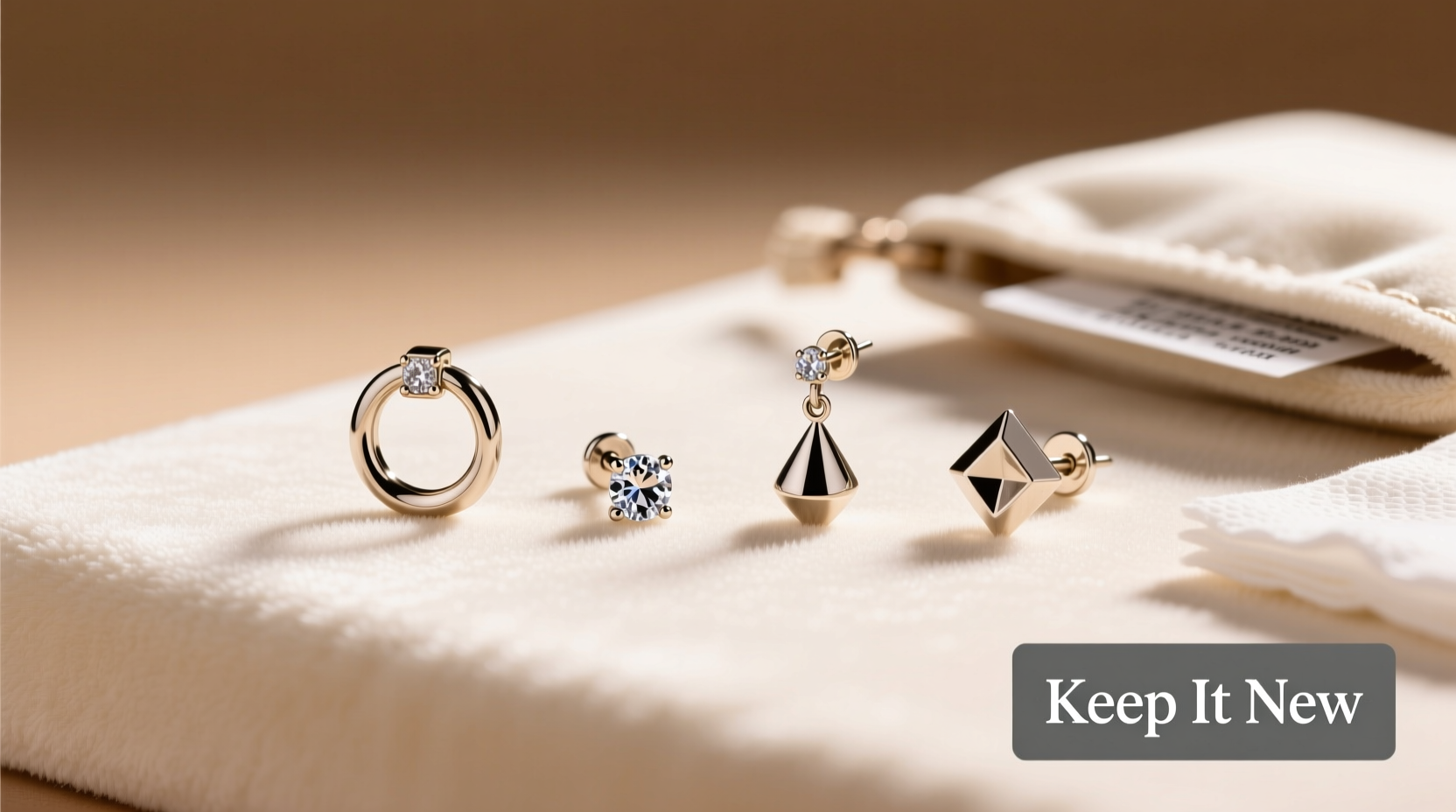Small earrings—whether delicate studs, tiny hoops, or minimalist drops—are staples in many jewelry collections. Their subtle elegance makes them ideal for everyday wear, but their size and intricate design also make them vulnerable to damage, loss, and tarnish. Without proper care, even high-quality pieces can lose their luster or break prematurely. The good news is that with consistent, thoughtful habits, you can preserve the beauty and integrity of your favorite small earrings for years.
Choose the Right Storage Method

One of the most overlooked aspects of earring care is storage. Tossing small earrings into a drawer or leaving them on a nightstand exposes them to dust, moisture, and physical stress. Proper storage prevents tangling, scratching, and bending—especially important for delicate posts, hinges, and clasps.
Dedicated earring organizers are ideal. Look for options with individual compartments, soft lining, or cushioned pads. For stud earrings, consider a fabric-lined tray with holes or slots to secure each piece. Hoops and hinged designs benefit from upright display cases that prevent warping.
Avoid These Common Storage Mistakes
- Leaving earrings loose in a jewelry box without dividers
- Storing near windows or humid areas like bathrooms
- Using plastic bags that trap moisture and accelerate tarnishing
- Keeping earrings clipped together when not in use (can strain backs)
Cleaning Techniques for Long-Term Shine
Regular cleaning removes oils, lotions, and environmental pollutants that dull metal and gemstones. However, aggressive methods can do more harm than good—especially with small settings where stones are more prone to loosening.
For gold, silver, or platinum studs and hoops, a gentle solution works best: mix a few drops of mild dish soap with warm water. Soak earrings for 5–10 minutes, then use a soft-bristled toothbrush (preferably one designated for jewelry) to lightly clean around settings and posts. Rinse under lukewarm water and pat dry with a lint-free cloth.
For non-porous gemstones like diamonds, sapphires, or cubic zirconia, this method is safe. Avoid soaking earrings with porous stones (such as pearls or opals) or glued-in components, as water can weaken adhesives.
“Even brief exposure to harsh chemicals can compromise the structural integrity of small earring settings.” — Lena Torres, Master Jeweler & Conservator
Step-by-Step Cleaning Routine
- Remove earrings after wearing and wipe gently with a microfiber cloth.
- Once a week, prepare a bowl with warm soapy water.
- Soak for no longer than 10 minutes.
- Use a soft brush to clean crevices and behind the backs.
- Rinse thoroughly under running water (use a strainer to prevent loss).
- Air-dry completely before storing.
Prevent Physical Damage and Loss
The smaller the earring, the easier it is to misplace or damage. Tiny screws, butterfly backs, and friction posts are especially fragile. A single drop on a hard surface can bend a post or crack a stone setting.
Always remove earrings before sleeping, exercising, or showering. Sweat and movement increase the risk of snagging or loosening. When removing them, do so over a soft surface like a towel or directly into a waiting container.
| Action | Benefit | Risk if Ignored |
|---|---|---|
| Remove before swimming | Prevents chlorine/saltwater corrosion | Tarnishing, metal weakening |
| Check backs weekly | Ensures secure fit, prevents loss | Losing an earring down a drain |
| Avoid perfume/lotion contact | Protects finish and stones | Dullness, residue buildup |
| Inspect prongs monthly | Catches loose stones early | Stone falling out unnoticed |
Real Example: The Case of the Missing Stud
Sophie, a teacher in Portland, wore her favorite diamond studs daily. One evening, she noticed one looked loose. She planned to get it checked “next week,” but by morning, the stone was gone. A jeweler later explained that the constant vibration from talking and moving had shaken the already weakened prong. Regular inspections could have prevented the loss. Now, Sophie schedules bi-monthly checkups and uses locking earring backs during work hours.
Best Practices Checklist
Follow this checklist to maintain your small earrings effectively:
- ✅ Store earrings in a lined case with individual compartments
- ✅ Clean once a week using mild soap and soft brush
- ✅ Inspect posts, backs, and prongs every two weeks
- ✅ Replace worn or bent earring backs promptly
- ✅ Keep away from perfumes, hairsprays, and lotions
- ✅ Remove before sleeping, bathing, or working out
- ✅ Take sensitive pieces to a professional for deep cleaning annually
- ✅ Label spare backs by size to avoid mismatching
Frequently Asked Questions
How often should I have my small earrings professionally inspected?
Jewelers recommend a professional inspection every 6 to 12 months, especially for pieces worn frequently. This ensures prongs are tight, metal isn’t fatigued, and settings remain secure.
Can I use rubbing alcohol to clean earring backs?
In moderation, yes—but only on metal parts. Dip a cotton swab in isopropyl alcohol to disinfect posts and backs, particularly if used daily. Avoid contact with gemstones or enamel, and never soak the entire earring.
Why do my silver earrings tarnish so quickly?
Silver reacts with sulfur compounds in the air, sweat, and certain cosmetics. To slow tarnishing, store silver earrings in anti-tarnish pouches or with silica gel packets. Wipe them after each wear and limit exposure to humidity.
Conclusion: Small Habits, Lasting Results
Preserving the condition of small earrings doesn’t require drastic measures—just consistency and attention to detail. By upgrading your storage, adopting a gentle cleaning routine, and staying vigilant about wear and tear, you protect both the aesthetic and monetary value of your collection. These tiny accessories may be small in size, but their impact on your style is significant. Treat them with care, and they’ll continue to shine through seasons and occasions.









 浙公网安备
33010002000092号
浙公网安备
33010002000092号 浙B2-20120091-4
浙B2-20120091-4
Comments
No comments yet. Why don't you start the discussion?